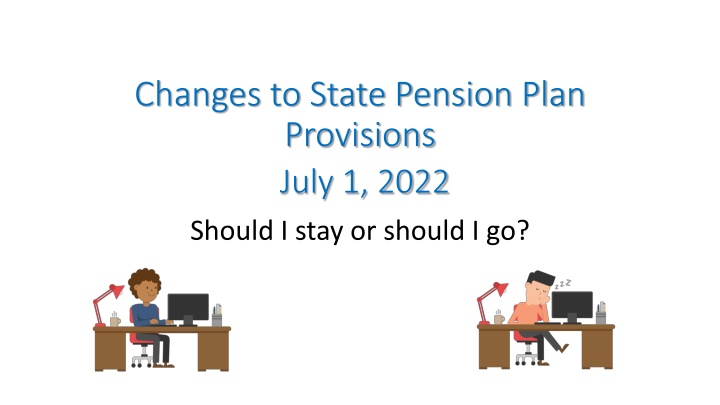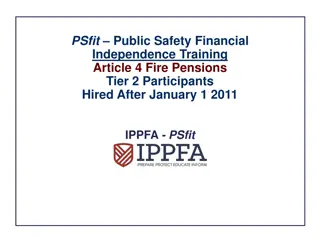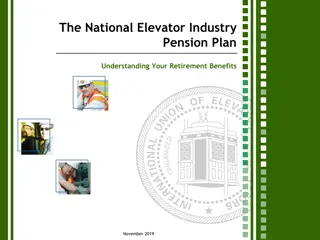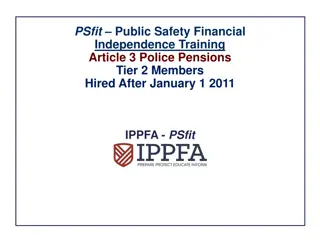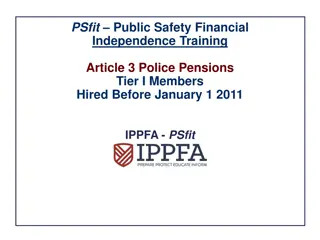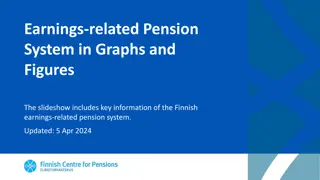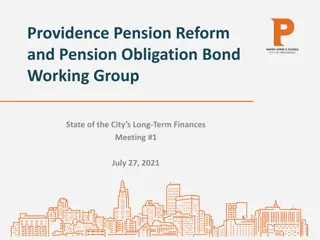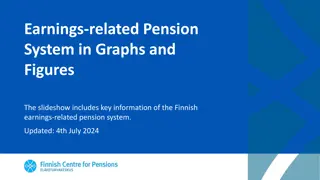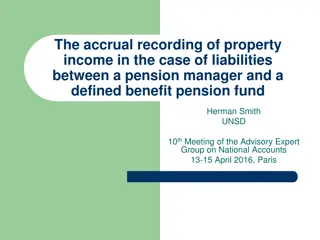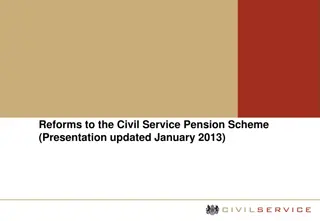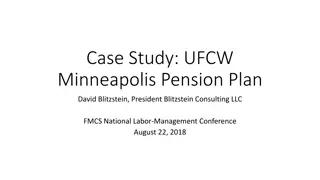State Pension Plan Provisions Changes Effective July 1, 2022
The 2017 collective bargaining agreement between the State and the State Employees Bargaining Coalition introduced changes to retirement terms for state employees, affecting members of the State Employees Retirement System (SERS) and the Alternate Retirement Plan (ARP). Changes include adjustments to retirement age, cost of living calculations, and retirement healthcare benefits. Notably, normal retirement ages vary between SERS tiers and may require different service credit requirements. Additionally, the calculation and timing of Cost of Living Adjustments (COLAs) have been modified. It is important for affected individuals to review these changes and understand how they impact their retirement planning.
Download Presentation

Please find below an Image/Link to download the presentation.
The content on the website is provided AS IS for your information and personal use only. It may not be sold, licensed, or shared on other websites without obtaining consent from the author.If you encounter any issues during the download, it is possible that the publisher has removed the file from their server.
You are allowed to download the files provided on this website for personal or commercial use, subject to the condition that they are used lawfully. All files are the property of their respective owners.
The content on the website is provided AS IS for your information and personal use only. It may not be sold, licensed, or shared on other websites without obtaining consent from the author.
E N D
Presentation Transcript
Changes to State Pension Plan Provisions July 1, 2022 Should I stay or should I go?
The 2017 collective bargaining agreement between the State and the State Employees Bargaining Coalition (SEBAC 2017) made certain changes to the terms of retirement for state employees. These changes will primarily impact members of the State Employees Retirement System (SERS), but members of ARP (Alternate Retirement Plan) who participate in the retiree health insurance program may also be affected.
The changes fall into three categories: Retirement Age Cost of Living Adjustments Retirement Healthcare
Normal Retirement Age SERS members who meets the minimum service credit requirement have a normal retirement age Retirement age for SERS Tier I members is 55 Retirement age for SERS Tier II and Tier IIA members is 60, if the member grandfathered in , i.e., made payments beginning in 2017 to maintain a normal retirement age of 60 with 25 years of retirement service credit or 62 with less than 25 years Members who did not grandfather in have a normal retirement age of 62 Tier II and Tier IIA members can take an early retirement as soon as age 55; however, there is a lifetime reduction in their benefit for retiring before the normal retirement age
For participants in Tier II and Tier IIA who are not grandfathered the new normal retirement age will change to 63 for members with 25 or more years of vesting retirement service credit For those who do not have 25 years of vesting retirement credit service the new normal retirement age will be 65 NEW Normal Retirement Age
Cost of Living Adjustments (COLAs) Cost of Living Adjustments (COLAs) SERS retirees, including Hybrid plan members, receive annual COLAs to their pensions. COLAs are calculated using the Consumer Price Index for Urban Wage Earners and Clerical Workers (CPI-W), which is a percentage of the rate of inflation during the twelve-month period preceding the COLA SERS members who retire under the current plan provisions receive a minimum annual COLA of 2%, even if applying the CPI-W would produce a lower rate The first COLA a member receives is awarded only on January 1 or July 1 each year, depending on the member s retirement date No COLA is administered until the member has been retired for at least nine months; a member must typically wait either nine or fourteen months for the first COLA is applied
NEW Cost of Living Adjustments (COLAs) No more minimum 2% guaranteed COLAs Retirees will receive a COLA in every year with inflation measurable under the CPI-W, and in years with inflation of 2% or less, the COLA will equal the CPI-W Retirees will be eligible for their first COLA thirty months after their date of retirement
RETIREE HEALTH INSURANCE COSTS Retired employees and their eligible dependents may participate in healthcare and prescription coverage through the state s self-insured retiree health plans; retirees pay a portion of the premiums for this coverage: Normal retirement with 25 or more years of service pay between 0 and 1.5% Normal retirement with less than 25 years of service pay between 1.5% and 3%
Healthcare Costs Continued Employees who retire early will pay different percentages for healthcare coverage: The percentage is the lesser of 25% of their monthly pension or a value based on a combination of their years of service and age at the time of retirement When any retiree becomes eligible for coverage under Medicare they are required to enroll in Medicare Parts A (hospital coverage) and B (doctor and outpatient services). The retiree is then transitioned to the state s group Medical Advantage Plan (MAPD); employees who are Medicare eligible at the time of retirement are enrolled directly in MAPD Certain high-income retirees must also pay an additional monthly premium for Parts B and D (prescription drug coverage) to the federal government There is no charge for enrollment in the MAPD and the retiree s premium charges for retirement healthcare coverage will end; if the retiree s eligible dependent(s) continue to be covered under the retiree healthcare plan, deductions will be made from the retiree s pension to pay coverage for only those dependents After a retiree enrolls in Medicare and the Medicare premiums have been verified, the state will reimburse the retiree in their pension check for the Medicare Part B premiums charged by the federal government
2022 Changes Will Affect Cost of Retiree Health Insurance in two different ways: 2. Retirees will continue to be fully- reimbursed for the standard Medicare Part B premium; however, certain high-income retirees will receive a reimbursement of only 50%of the additional cost they are required to pay for Medicare 1. A portion of premiums for retiree healthcare must be paid by retirees who have taken a normal retirement and are not yet eligible for Medicare The new rates will be 5% of premium costs
It is important to remember that while these changes can potentially affect a retiree s pension benefit, the dollar amount is only one consideration in retirement planning Employees contemplating retirement should also weigh factors such as: how long they would like to continue working what financial or other obligations they might have where they d like to live as a retiree and the cost of living in that area if they will have income from a source other than their SERS benefit and if so, how long that might continue the needs of family members and dependents
Its also crucial to think about what you will do with your extra time . . . Gardening? Golfing? Take up dancing? Travel? Catch up on your reading? The choices are endless, but the important thing is to plan now, so you can ENJOY your retirement!
Additional Tips: You can calculate your estimated retirement benefit using the State Comptroller s online benefits calculator at https://www.osc.ct.gov/rbsd/retirement/contacts. html Retirements from SERS are effective the first of the month Human Resources must prepare your paperwork and obtain certain documentation from you; that process can take several weeks, depending how may other employees have chosen to retiree that month To avoid any delay in receiving benefits, provide as much notice as possible to allow for the timely processing of your application Still confused? Email Human Resources for more information at Ardell@easternct.edu
If you are one of the estimated 13,000 state employees eligible for normal or early retirement before July 1, 2022, you will want to carefully consider the three changes discussed today. While any or all of these may influence your retirement planning, it is impossible to forecast exactly how your benefit would be impacted, because the financial calculations depend on variables such as future rates of inflation, costs of health insurance coverage and Medicare, and your personal financial circumstances. Questions about retirement should be referred by email to HR Director Lourdes Ardel at Ardell@easternct.edu
Retirement is a deeply personal decision, and we hope this information helps you make the best choice for you.
